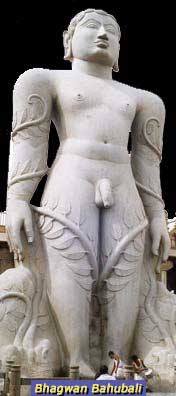 |
Originating
in the Indian subcontinent, Jainism - or, more properly, the Jain Dharma - is one of the oldest religions of its homeland and indeed of the world. Having prehistoric origins before 3000 BC, the twenty-four Tirthankars
 guided its evolution and elaboration by first achieving, and then teaching path to salvation. Jain religion is unique in that, during its existence, it has never compromised on concept of nonviolence either in principle or practice. It upholds nonviolence as the supreme religion (Ahimsa Paramo
Dharmah) and has insisted upon its observance in thought, word, and deed at the individual as well as social levels. guided its evolution and elaboration by first achieving, and then teaching path to salvation. Jain religion is unique in that, during its existence, it has never compromised on concept of nonviolence either in principle or practice. It upholds nonviolence as the supreme religion (Ahimsa Paramo
Dharmah) and has insisted upon its observance in thought, word, and deed at the individual as well as social levels.
Jainism begins with a serious concern for the human soul in its relationship with the laws governing existence in the
universe, with other living beings, and to its own future state in eternity. First and foremost, it is a religion of the
heart. Jains have deep compassion for all forms of life. Jainism offers a quiet, overwhelmingly serious way of life, a cultural insistence on compassion, a society of ethics that has dramatically changed the world and will continue to effect change. Jainism is an ecologically responsible way of life which
paves way for a perfectly friendly co-existence of all the worldly
beings.
The holy text Tattvartha Sutra sums it up in the phrase "Parasparopagraho Jivanam" (all life is mutually supportive). Jain religion presents a truly enlightened perspective of equality of souls, irrespective of differing physical forms, ranging from human beings to animals and microscopic living organisms. Humans, alone among living beings, are endowed with all the six senses of seeing, hearing, tasting smelling, touching, and thinking; thus humans are expected to act responsibly towards all life by being compassionate,
ego-less, fearless, forgiving, and rational.
The Way
of Life
The
Jain Dharma has a code of conduct that guides Jains to live an ideal
life. In short, the code is made up of the following five vows, and all of their logical conclusions:
 Ahimsa
(non-violence) Ahimsa
(non-violence)
 Satya (truthfulness)
Satya (truthfulness)
 Asteya
(non-stealing) Asteya
(non-stealing)
 Aparigraha
(non-possessiveness) and Aparigraha
(non-possessiveness) and
 Brahmacharya (chastity). Brahmacharya (chastity).
Jain religion focuses much attention on Aparigraha, non-possessiveness towards material things through self-control, self-imposed penance, abstinence from over-indulgence, voluntary curtailment of one's needs, and the consequent subsiding of the aggressive urge.
Vegetarianism is an extremely integral part of a Jain's way of life.
The concept is based on compassion for living beings, Jiva Daya. The practice of vegetarianism is seen as an instrument for the practice of
non-violence and peaceful, cooperative coexistence. Jains are strictly vegetarians, consuming only one-sensed beings, primarily from the plant kingdom.
While the Jain diet does, of course, involve harm to plants, it is regarded as a means of survival which involves the bare minimum amount of violence towards living beings. (Many forms of plant material, including roots and certain fruits, are also excluded from the Jain diet due to the greater number of living beings they contain owing to the environment in which they develop.)
The
Philosophy
Jains
believe that God did not create the universe. If God created it, then
who created God ? Who created the creator? If God has created the
universe, he has to have a desire to create. The desire makes the God
imperfect and he cannot be imperfect. From another angle, if God
carries out the task of creation and destruction without any purpose
then it becomes a meaningless game. If he carries out all this work on
account of his supreme grace he would have made all Jivas
(souls) happy and he would have created things that would have given
happiness to all. But that is not the case. Therefore, God must
not be managing the affairs of the universe.
Since
God is omniscient, omnipotent, and devoid of desires, and passions, He
could not be interested in the matters of universe. Some claim that
all creatures are God's images and we are all parts of Him?" If
so, then, we should all have unlimited bliss, perfect perception,
perfect knowledge and perfect conduct. But that is not true.
Therefore, we cannot be a part of the God or his images.
Jain
Concept of Universe:
As per Jain beliefs, God has
absolute knowledge. Therefore, he reveals the essential and real form
of the universe. He revealed that the world is without a beginning. It
has no beginning. It has no end. The universe does undergo continuous
change. Production and disposal are always going on. Behind this
eternal process there does not exist anyone's planning or
organization. The whole universe is a self-regulated one.
For
living beings, his/her karma plays an important role. Karma
is finest matter that our soul attracts based on our thought,
speech and/or action. Bad karma pollutes
the inherent qualities of the soul. The bondage and deliverance of
each individual belong to himself or herself. The experience of
happiness or sorrow belongs to each individual and the experience is
his own. According to his past karma,
his present fate is decided, and his future will be decided based
on his presented the balance of past karma.
The
Doctrine of Anekanta
(Manifold Aspects):
Anekantväd
is the
basis of Jainism. It is the life-force of the Jain philosophy. Because
of the beginning-less past and the endless future, a common person
cannot perceive innumerable qualities and infinite modes of an entity
(sat, dravya). At a single moment he/she can be aware of one or few
qualities and modes of the substance. This complex subject of eternity
and transitoriness of the substance involving innumerable qualities
and infinite modes leads to the doctrine of anekantavada,
(manifold aspects). In other words, one cannot fully describe the
nature of substance without anekantavada.
Even
though there is only one absolute truth but there are many aspects of
the truth. There is no one aspect of the truth. Once we think there is
only one aspect of the truth then we become prejudiced, narrow-minded
and limited. As we allow room for other aspects of the truth, we
become open minded and anekantvadi.
Anekantvad
helps
us 1) to learn more than one quality of an object, 2) to overcome our
limited knowledge, 3) to overcome incompleteness of our knowledge and
4) to overcome the limitation of verbal expression.
|